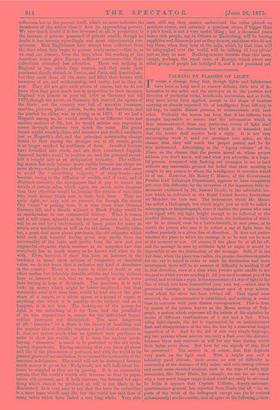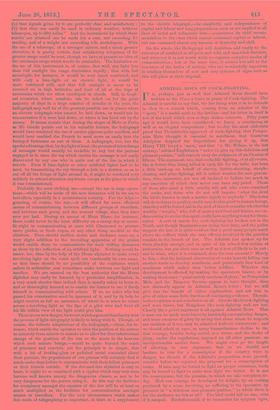TALKING BY FLASHES OF LIGHT.
TT seems a strange thing that, though lights and lighthouses
1 have been so long used to convey definite little bits of in- formation to the sailor and the surveyor as to the position and direction of particular rocks, headlands, mountains, and so forth, they have never been applied, except in the shape of beacons carrying an already expected bit of intelligence from bill-top to hill-top, to enable distant persons to communicate with each other. Probably the reason has been that it: has hitherto been thought impossible to ensure that the information which is thus communicated from any particular centre of light shall actually reach the destination for which it is intended, and that the sender shall receive back a reply. It is not very encouraging work to send out messages into space, on the chance that they will reach the proper person and be by him understood. Advertising in the "Agony column" of the Times, on the chance that the person aimed at, whose proper address you don't know, will read what you advertise, is a hope- ful process, compared with flashing out messages to sea or land without any reasonable ground for belief that their meaning is caught by any person to whom the intelligence it contains would be of use. However, Mr. Henry C. Mance, of the Government Persian Gulf Telegraph Department, appears to have completely got over this difficulty, by the invention of the ingenious little in- strument explained by Mr. Samuel Goode, in the admirable lec- ture which he delivered at the Royal United Service Institution on Monday, the 14th inst. The instrument, which Mr. Mance has called a Heliograph, but which might just as well be called a selenograph or lampadograph, since it enables the person who uses it to signal with any light bright enough to be reflected to the needful distance, is simply a little mirror, the inclination of which can be so altered, even by a hair's-breadth, in any plane, as to enable the person who uses it to reflect a ray of light from its surface precisely in a given line of direction. It does not matter whether the place to which the message is to be sent can be seen at the moment or not. Of course, if the place be at all far off, and the message be sent by artificial light at night, it would be impossible to see the destination of the message. Still, if in the day-time, when the place was visible, the precise direction requisite for the ray to travel in order to reach its destination had been ascertained, there will be no manner of difficulty in. sending it off in that direction, even at a time when you are quite unable to see the goal to which you are sending it. All you need to assure you of its arrival, and to obtain a reply, is the appearance of a star of light in the line in which you have transmitted your own ray,—which star is perceived through a minute transparent spot of your mirror, from which the silver has been rubbed off. That signal once received, the communication is established, and nothing is easier than to converse with your distant correspondent. This is done by means of the system known as the Morse system of Tele-
graph, a system which expresses all the letters of the alphabet by means of different combinations of a dot and a line. When using light-signals, the dot is represented by an instantaneous flash and disappearance of the star, the line by a somewhat longer apparition of it. And by the aid of this very simple language, any two persons whose mirrors can carry a flash over the distance between them may converse at will for any time during which their lights serve them. But how far can signals of this kind be perceived ? The answer is, of course, that this depends very much on the light used. With a bright sun and a tolerably good altitude, there seems no sort of difficulty in conversing at the distance of fifty miles; and with strong mirrors and much more elevated stations, such as the tops of really high mountains, like Mont Blanc, for example, we can see no reason why a very much longer range indeed could not easily be attained. In India it appears that Captain Collette, deputy-assistant- quartermaster-general, has reported from Simla that all "the re- ports of the work of the heliograph except one (to be noticed subsequently) are favourable, and all agree on the following points : (a) that signals given by it are perfectly clear and satisfactory ;
(b) that they can easily be used in ordinary weather, without telescopes, up to fifty miles." And the instrument by which these results are attained can be made for a sum not exceeding £5 sterling, and of a weight not exceeding 5 lb. avoirdupois. With the use of a telescope, of a stronger mirror, and a much greater elevation, it is pretty certain that satisfactory telegrams of far greater range could be sent, though we have at present no idea of the maximum range which would be attainable. The limitation on the use of this instrument is, of course, that with any light less than full sunlight the range diminishes rapidly ; that with full moonlight, for instance, it would be very much restricted, and with only a lime-light or an electric light, it would be more restricted still, and that full sunlight is never to be counted on in high latitudes, and least of all at the tops of mountains which are often enveloped in clouds. Still, in tropi- cal countries, where sunshine can be relied on for the great majority of days in a large number of months in the year, the heliograph may well be of the greatest possible use in places where an electric telegraph-wire cannot be laid down, or would not be remunerative if it were laid down, or where it has been cut by the enemy. It seems certain that during the sieges of Metz or Paris, as Mr. Goode points out in his valuable lecture, the heliograph would have rendered the use of carrier-pigeons quite needless, and would have enabled the French to send news as easily into the besieged fortresses as out of them. A heliograph, too, has the special advantage that, by daylight at least, the process of interchange of messages would usually be invisible to any but the persons engaged in it, since the ray which carries the message is not easily discovered by any one who is quite out of the line in which it travels. Even if lime-lights or other artificial lights had to be used, by transmitting the ray through a hole in a shutter, so as to cut off all the fringe of light around it, it might be rendered very unlikely to attract attention anywhere except at the place to which it was commissioned.
Probably the most striking use—except the use in siege opera- tions—which will be made of the new invention will be its use to travellers, especially in a mountainous country. For the Alps,— granting, of course, the sun,—it will afford far more effectual means of communicating between different groups of travellers, and between each group and the nearest village, than they have ever yet had. During an ascent of Mont Blanc, for instance, there could never be the least difficulty on a sunny day or moon- lit night in communicating at once with Chamouni to procure more guides, or fresh ropes, or any other thing needful to the climbers. Even should sudden storm and darkness come on, a very slight addition to the travelling apparatus of the guides would enable them to communicate for such trifling distances as these by the reflection of an artificial light. Nothing would be easier, too, than by the help of the Morse alphabet to make every revolving light on the coast spell out continually its own name, so that there should be no possibility of the confusion which sailors in unfamiliar seas sometimes make between one light and another. We are assured on the best authority that the Morse alphabet may easily be learned, by a particular simplification, in a very much shorter time indeed than is usually taken to learn it, and so thoroughly learned as to enable the learner to use it freely himself in communicating with others. If so, no sailor who has passed his examination need be ignorant of it, and by its help he might receive as full an assurance of where he is when he comes across a revolving light as the lips of a pilot who had lived all his life within view of the light could give him.
There is one new danger, however,which a general familiarity with the process of light-telegraphy is likely to bring with it. Though, of course, the delicate adaptations of the heliograph,—those, for in- stance, which enable the operator to alter the position of the mirror so minutely from minute to minute as to allowfor that infinitesimal change of the position of the sun or the moon in the heavens which each minute brings,—would be quite beyond the reach of prisoners and convicts, yet the principle is so simple, that with a bit of looking-glass or polished metal concealed about their persons, the populations of our prisons will certainly find it much easier than before to communicate with their fellow-prisoners or their friends outside. If the dot-and-line alphabet is easy to learn, it might be so combined with a cypher which may very soon become well known among the dangerous classes, as not to be very dangerous for the person using it. In this way the facilities for conspiracy amongst the enemies of the law will be at least as much multiplied as the facilities for communication amongst armies or travellers. For the very circumstance which makes this mode of telegraphing so important, at least as a supplement to the electric telegraph,—its simplicity, and independence of capital and labour and long preparations, such as are implied in all lines of aerial and submarine wire,—constitutes its chief recom- mendation to the class which cannot command capital or labour, but can command almost any amount of dexterity and skill.
On the whole, the Heliograph will doubtless add vastly to the resources of mankind in all poor and wild and unsettled districts, and wherever it is not worth while to organise complete modes of communication ; but at the same time, it cannot but add to the resources of the Arabs of society, who are wonderfully ingenious in availing themselves of new and easy systems of signs such as this will place at their disposal.



































 Previous page
Previous page